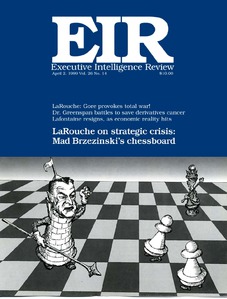Strategic Alert
Gore provokes total war!
by Lyndon H. LaRouche, Jr.
An urgent policy memorandum by Lyndon H. LaRouche, Jr.
Science & Technology
Curie conference reflects on impact of discovery
Poland’s President Aleksander Kwasniewski, speaking on the centenary of the Curies’ discovery of polonium and radium, proposed a permanent dialogue on the “problems at the borderline of politics, science, and economic life.” We print his speech, plus his exchange of letters with Dr. Zbigniew Jaworowski, who praised the President’s commitment to science, while debunking some prominent unscientific myths which were reflected in the President’s speech. Dr. Jaworowski is a professor at the Central Laboratory for Radiological Protection in Warsaw and a former chairman of the United Nations Scientific Committee on the Effects of Atomic Radiation.
Departments
Africa Report
by Linda de Hoyos
Ugandan army under fire.
Australia Dossier
by Allen Douglas
Queen’s crony cleans up.
Editorial
“Only weeks away from nuclear war?”
Economics
Dr. Greenspan battles to save the derivatives cancer
by John Hoefle
Despite warnings by outgoing Commodity Futures Trading Commission chairman Brooksley Born that “the size and nature of the OTC market create a potential for systemic risk to the nation’s financial markets,” Federal Reserve chairman Alan Greenspan is defending the speculative bubble.
Peru’s Fujimori must abandon the IMF, before it is too late
by Luis Vásquez Medina
The Fujimori government continues to underestimate the international financial crisis, mistakenly believing it to be temporary in nature.
Denmark debates curbs on speculation
by Michelle Rasmussen
The worldwide crisis today
by Maurice Allais
Part two of a three-part series by French economist Maurice Allais, Nobel Prize winner in Economic Science in 1988.
China tells USDA forum: We need food self-sufficiency, not ‘free markets’
A speech by Min Yaoling, Director General, Market and Economic Information Department, Chinese Ministry of Agriculture, to the 75th annual U.S. Department of Agriculture Agricultural Outlook Forum.
Business Briefs
Feature
Mad Brzezinski’s chessboard
by Lyndon H. LaRouche, Jr.
“If you had thought Bozo the Clown is now just a memory from a Baby-Boomer’s childhood, you obviously had not studied the March-April edition of the New York Council on Foreign Relations’ organ, Foreign Affairs,” writes LaRouche. “This revival of geopolitics, as featured within the current Foreign Affairs, could start World War III. Conceded: this would not be the same kind of war as World War I and II. It would be much different, but, in the end, much worse: the kind of war no one would know how to bring to an end. It would evolve into a doomsday war, featuring included use of nuclear weapons, the kind of war which, minus the nuclear weapons, was customary until the Fifteenth-Century birth of the sovereign nation-state.”
International
To war with the IMF, or to peace with LaRouche
by Umberto Pascali
What seemed unimaginable, is now happening: an escalating confrontation in the Balkans, massive deployments by NATO, relentless bombings, the world divided into two opposing camps—and a realization that World War III is close, indeed.
The new NATO’s long march toward World War III
by Umberto Pascali
Umberto Pascali looks at the evolution of NATO’s “new strategic concept.”
The winds of Al-Sumoom: a curse or a blessing for Iraq?
by Hussein Al-Nadeem
Whether the attacks on Iraq escalate, will be determined by the strategic situation, not by what Saddam Hussein does or does not do.
Germany’s Lafontaine resigns, as economic reality strikes
by Rainer Apel
Colombians remoralized by LaRouche movement
by Gretchen Small
The demonstration that LaRouche’s ideas constitute a major force in Colombia, has changed the assessment of the potentialities of the battlefield by patriotic circles, as well as by London’s Dope, Inc. machine, which thought that the country was theirs to destroy.
Interpol heroin conference exposes U.S., EU hypocrisy on Myanmar
by Gail G. Billington
The head of Interpol’s Criminal Intelligence Department described Myanmar’s 15-year drug eradication plan as “not a program that has been put together with chewing gum and baling wire. I am confident it will succeed.” It’s time for the United States to stop playing the British game.
Is the Trilateral Commission becoming an extinct species?
by Scott Thompson
A report on the Commission’s annual meeting, in Washington.
Documentation: From the U.S. section of the Commission’s draft report, by Bush-leaguer Robert Zoellick, who views the “Survivors’ Club,” led by Russia, China, and India, as a threat.
National
Will history charge Al Gore with starting World War III?
by Debra Hanania Freeman
Only a clear commitment on the part of the United States that it will help Russia recover from IMF devastation, could repair U.S.-Russia relations.
Blind hysteria: Yahoos dominate in frayed GOP
by Michele Steinberg
With the “self-righteous right,” the politics of the Republican Party resembles an epidemic of road rage more than a serious political organization.
National News
Congressional Closeup
by Carl Osgood



